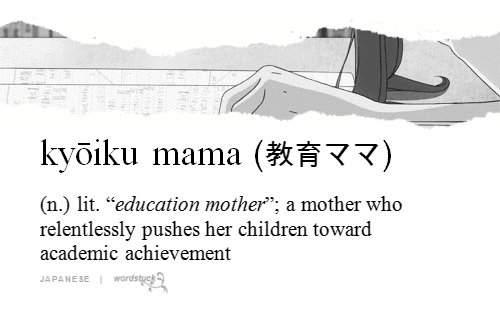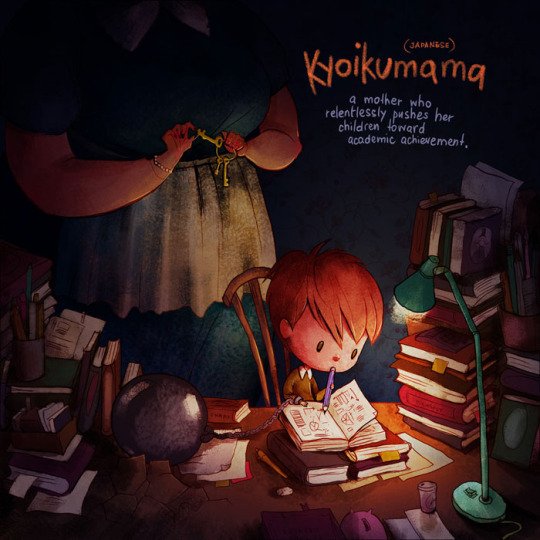Hello peeps! @ailindigo here :)
We're now on the 38th week of Untranslatable Words and this time we'll remain on Asia, jusy going up north a bit, to Japan! This time we're talking about a term that makes us reflect on society and its influence on people.
This week's word is the japanese: kyōiku mama.
Gif by Wordstuck

kyōiku mama
This was definitely an interesting find, this is one of those words that really tells a lot about a culture.
Kyōiku mama (教育ママ) is a Japanese pejorative term which translates literally as "education mother". It refers to a stereotyped figure in modern Japanese society portrayed as a mother who relentlessly drives her child to study, to the detriment of the child's social and physical development, and emotional well-being. *
When I fist saw this term it kinda made sense to me why japanese youth is the way it is, less wild in comparisson and more perfection focused. This term “kyoiku mama” has negative connotations. The kyōiku mama is seen as stress factor on her child’s social and physical and emotional development in that she is relentlessly driving her child to study to pass competitive entrance examinations or to gain entry into top schools. *
But where did this term come from? How did it originate? Child-rearing women in the 1960s inspired the media to produce the idiom kyōiku mama, which referred to "the domestic counterpart of sararii-man" (salaryman). This encompassed a major responsibility to "rear children, especially the males, to successfully pass the competitive tests needed to enter high school and college". No such idiom emerged that deemed men "education papas"; it was "mamas" who became a social phenomenon. *
Also, Japanese education system played a big role in this. The education system and larger political economy it serves influence why mothers become obsessed with children's education. Social prejudices influence media stereotypes of kyōiku mamas that blame women rather than political conditions. Ordinary people, including mothers, feel powerless to change this system. Because a child's life appears to be determined by what schools he or she attends, many mothers take extraordinary measures to get children into good schools. *
Illustration by Marija Tiurina

In Japan, a mother who works is commonly seen as selfish in a society where child-raising is linked directly with the physical closeness between mother and child. This emphasis can be a cause of the development of a kyōiku mama who always worries about her children's education success. When compared to American mothers, Japanese mothers have a stronger belief in effort as opposed to innate ability. Japanese children see their efforts as necessary to fulfill a social obligation to family, peers, and community. Mothers pressure children because they are held strongly accountable for their children's actions. *
Now, there's a very specific example that really got me kind of shocked. Housewives are surrounded by popular media that encourages their actions. Daytime television, magazines, products, and services for mothers are largely focused on improving the home and raising the children. Thus, the job of motherhood is taken very seriously by mothers in Japan. A common description of a mother's free time is “three meals and a nap.” When I read this common description it really gave me an idea of how serious this is in this culture. *
I think this is definitely an interesting kind of phenomenon(? as there's no other culture who puts this much importance on child-rasing, arguably; and it has had effects on children, some good and some bad, like kids ending up developing stress, school phobias or having less drug use, depression, violence, and teenage pregnancy, in comparisson to modern American children. This is why this stereotyped figure is both feared by her children but envied by the other mothers.
What do you think? Is a kyōiku mama a good or bad figure? Please feel free to let me know what you think in the comments!
Thank you very much for passing by! And if you have an Untranslatable Word you'd like to suggest, please don't hesitate to do so! :)
Previous Untranslatable Words:
#32: ishin-denshin - Japanese telepathy
#33: gökotta - connecting with nature and ourselves
#34: kalpa - the longest time measurement
#35: shěnměi píláo - When love fades away
#36: Hyppytyynytyydytys - Finns' relaxed way of life by crossculture
#37: Oodal - Couples' fake anger
This content is part of a new series to get more people interested on languages and how they, perception and culture are related!
Exclusively for the Hive Cross Culture Community, the community for language exchange and cross-cultural purposes.
If you'd like to be part of the discussion don't hesitate to hop into the Hive Language and Culture Exchange Discord server! As well as subscribing to the Hive Cross Culture Community so you don't miss any new word comming ;) We'll be sharing a new Untranslatable Word each week!

Your content has been voted as a part of Encouragement program. Keep up the good work!
Use Ecency daily to boost your growth on platform!
Support Ecency
Vote for Proposal
Delegate HP and earn more